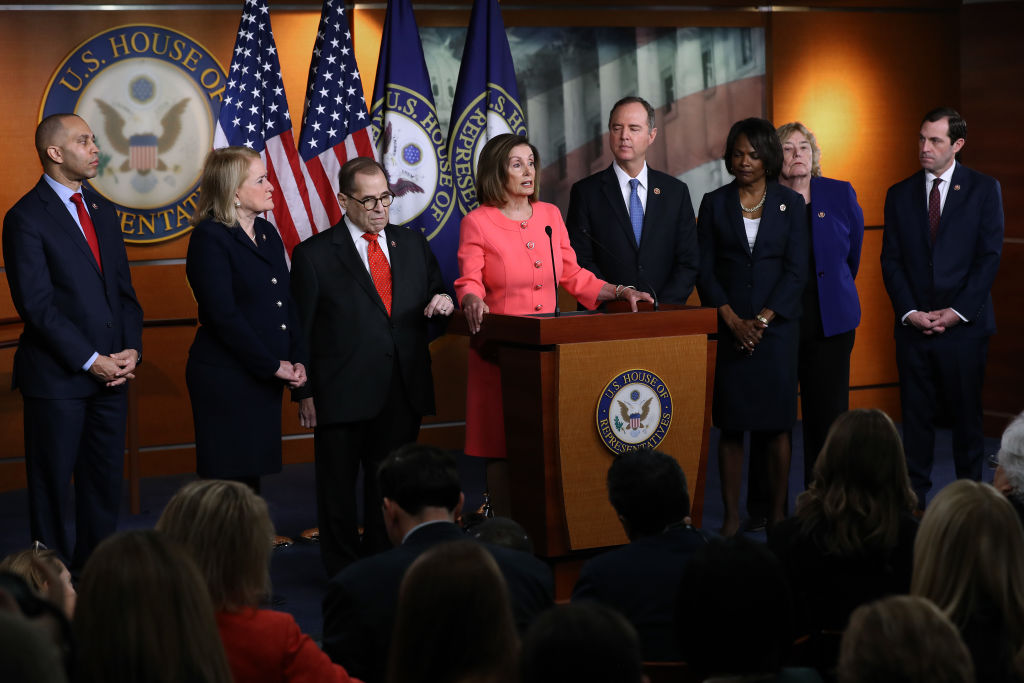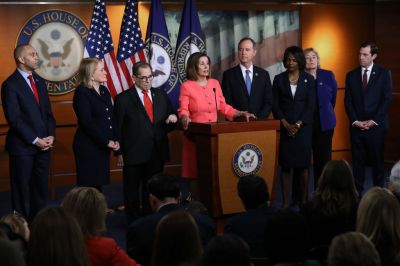President Joe Biden’s decision earlier this month to issue a presidential pardon to his son Hunter for any potential offenses committed in the last decade stirred social media controversy, with many internet users relating the news to the first impeachment of President-elect Donald Trump. They argue that Trump was impeached for inquiring about Hunter’s potential crimes.
“Hunter Biden was just pardoned for what included a massive bribery scandal in Ukraine,” tweeted John Cardillo, a former police officer turned right-wing social media influencer. “Trump was impeached for a phone call to Zelenskyyy to uncover Hunter’s bribery scandal by the people who now expect him to give Ukraine billions. DC needs an exorcism.”
Sean Davis, CEO and co-founder of The Federalist, also made the claim. “They impeached Trump for merely asking about Hunter’s corrupt influence-peddling, then turned around and pardoned Hunter for the tiny fraction of crimes he committed that he was only charged with by accident,” he tweeted.
“Reality: Trump was impeached for attempting to investigate all of the crimes that Joe just pardoned Hunter for,” tweeted Cliff Maloney, a right-wing activist who falsely accused Pennsylvania nuns of voter fraud a couple of months ago.
Joel Pollak, the senior editor-at-large at Breitbart, similarly tweeted, “Lawfare Democrats impeached Trump for trying to investigate what Biden basically just pardoned Hunter for doing.”
These claims are missing context. Trump wasn’t impeached for merely inquiring into the Biden family. The articles of impeachment cited Trump’s use of the power of his office to pressure “the Government of Ukraine to publicly announce investigations that would benefit his reelection, harm the election prospects of a political opponent, and influence the 2020 United States Presidential election to his advantage.” Trump made those personal requests conditional on military aid, pertaining to the president’s official role, and later also obstructed Congress’ investigation into it by ignoring subpoenas.
The articles also alleged that in a July 2019 phone call, Trump had “corruptly solicited” Ukrainian President Volodymyr Zelensky to announce public investigations into Joe and Hunter Biden, in addition to the cybersecurity company, CrowdStrike, regarding a purported server—that quite possibly never existed—and supposedly showed evidence of Ukrainian interference in the 2016 presidential election. In December 2019, FBI Director Christopher Wray expressed doubt about the CrowdStrike theory, saying, “We have no information that indicates that Ukraine interfered with the 2016 presidential election.”
Acting “with the same corrupt motives,” per the impeachment articles, Trump then allegedly made nearly $400 million in military aid to Ukraine and a White House meeting conditional upon Zelensky making those public inquiries. In addition to “abuse of power,” the articles also charged Trump with obstruction of Congress for ignoring subpoenas issued in the House of Representatives’ impeachment inquiry.
How does Hunter Biden fit into the equation? He joined the board of directors of Burisma, a Ukraine-based natural gas company co-founded and owned by Ukrainian oligarch Mykola Zlochevsky, in 2014. Two years earlier, then-Ukrainian prosecutor general Viktor Pshonka had opened investigations into potential criminal activity from Zlochevsky involving tax evasion and money laundering. Pshonka was ultimately removed as prosecutor general in 2014, months before Biden joined Burisma, though legal scrutiny into Zlochevsky’s possibly illegal behavior continued.
While Joe Biden was serving as vice president in the Obama administration, he pushed Ukrainian leaders for a series of reforms, including the removal of the country’s prosecutor general Viktor Shokin over concerns he was insufficiently investigating corruption allegations. In 2015, U.S. Ambassador to Ukraine Geoffrey Pyatt criticized Shokin for impeding an investigation into Burisma and Zlochevsky.
As Radio Free Europe/Radio Liberty detailed in 2019, the European Union, the International Monetary Fund, and Ukrainian anti-corruption activists also wanted Shokin to be removed. Biden later said that while on a diplomatic visit to Ukraine in 2015, he made a $1 billion loan guarantee conditional on Shokin’s ousting. Months later, the Ukrainian leaders acquiesced, and Shokin was relieved as prosecutor general.
Biden detailed the behind-the-scenes diplomacy in January 2018 while speaking on a panel for the Council on Foreign Relations, an independent, U.S.-based think tank. “I’m desperately concerned about the backsliding on the part of Kyiv in terms of corruption,” Biden said. He then explained that although Ukrainian leaders promised action against Shokin, they never went through with it—so he made the $1 billion loan guarantee conditional. Biden recalled, “I looked at them and said: ‘I’m leaving in six hours. If the prosecutor is not fired, you’re not getting the money.’ Well, son of a b—, he got fired.”
It’s unclear whether Shokin was investigating Zlochevsky and Burisma during his tenure as prosecutor general. Then-U.S. Ambassador to Ukraine Geoffrey Pyatt said in September 2015 that the United Kingdom had notified Shokin’s office that it seized $23 million from Zlochevsky “that belonged to the Ukrainian people.” However, Pyatt said, Shokin’s office did not support the seizure, so the money was released. “Instead, they sent letters to Zlochevsky’s attorneys attesting that there was no case against him,” Pyatt added. Nonetheless, in the eyes of Trump, this was evidence of Biden’s corruption. Responding online to Biden’s comments made at the CFR panel, Trump tweeted, “A disgrace. Total corruption!”
According to a memo of Trump’s July 2019 phone call with Zelensky—which is not a verbatim transcript of their conversion, but a summary informed by the “notes and recollections” of staffers present at the call—Trump mentioned Hunter Biden directly. “There's a lot of talk about Biden's son, that [Hunter] Biden stopped the prosecution,” Trump was summarized as saying, “and a lot of people want to find out about that so whatever you can do with the Attorney General would be great. Biden went around bragging that he stopped the prosecution so if you can look into it... It sounds horrible to me.”
Hunter Biden’s presidential pardon did not pertain to any single criminal accusation. Rather, it was a blanket pardon that applies to all federal “offenses against the United States which he has committed or may have committed or taken part in” in the last 10 years. The only specific criminal accusations mentioned in the pardon are his fraudulent gun forms case, for which he was convicted in June, and his tax evasion charges, to which he pleaded guilty in September. Prior to receiving a pardon, the sentencing dates for both cases were scheduled for mid-December. While there is no mention of Biden’s business in Ukraine, the pardon applies to any potential offenses occurring since January 1, 2014—the same year he joined Burisma’s board of directors.
If you have a claim you would like to see us fact check, please send us an email at factcheck@thedispatch.com. If you would like to suggest a correction to this piece or any other Dispatch article, please email corrections@thedispatch.com.







Please note that we at The Dispatch hold ourselves, our work, and our commenters to a higher standard than other places on the internet. We welcome comments that foster genuine debate or discussion—including comments critical of us or our work—but responses that include ad hominem attacks on fellow Dispatch members or are intended to stoke fear and anger may be moderated.
With your membership, you only have the ability to comment on The Morning Dispatch articles. Consider upgrading to join the conversation everywhere.